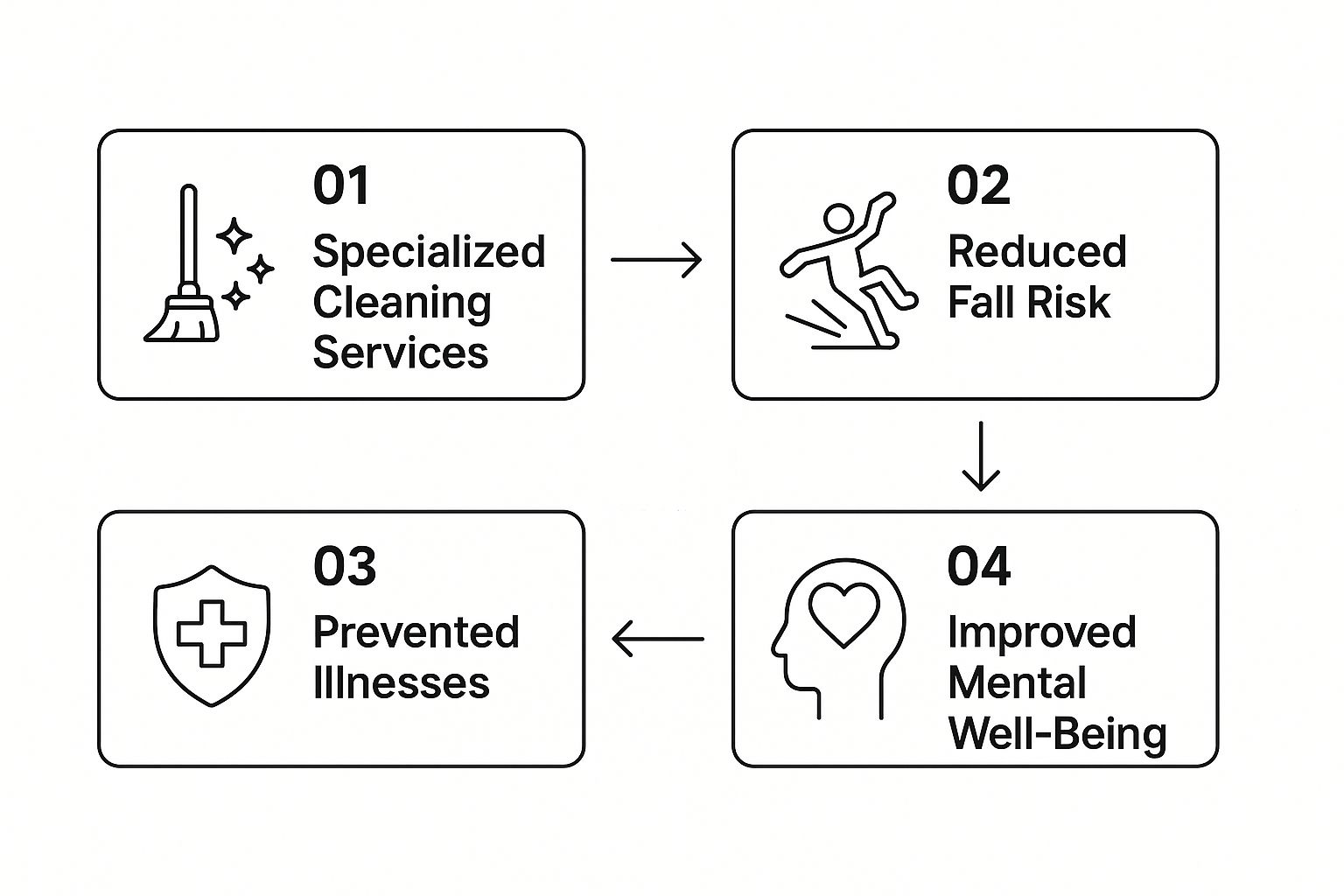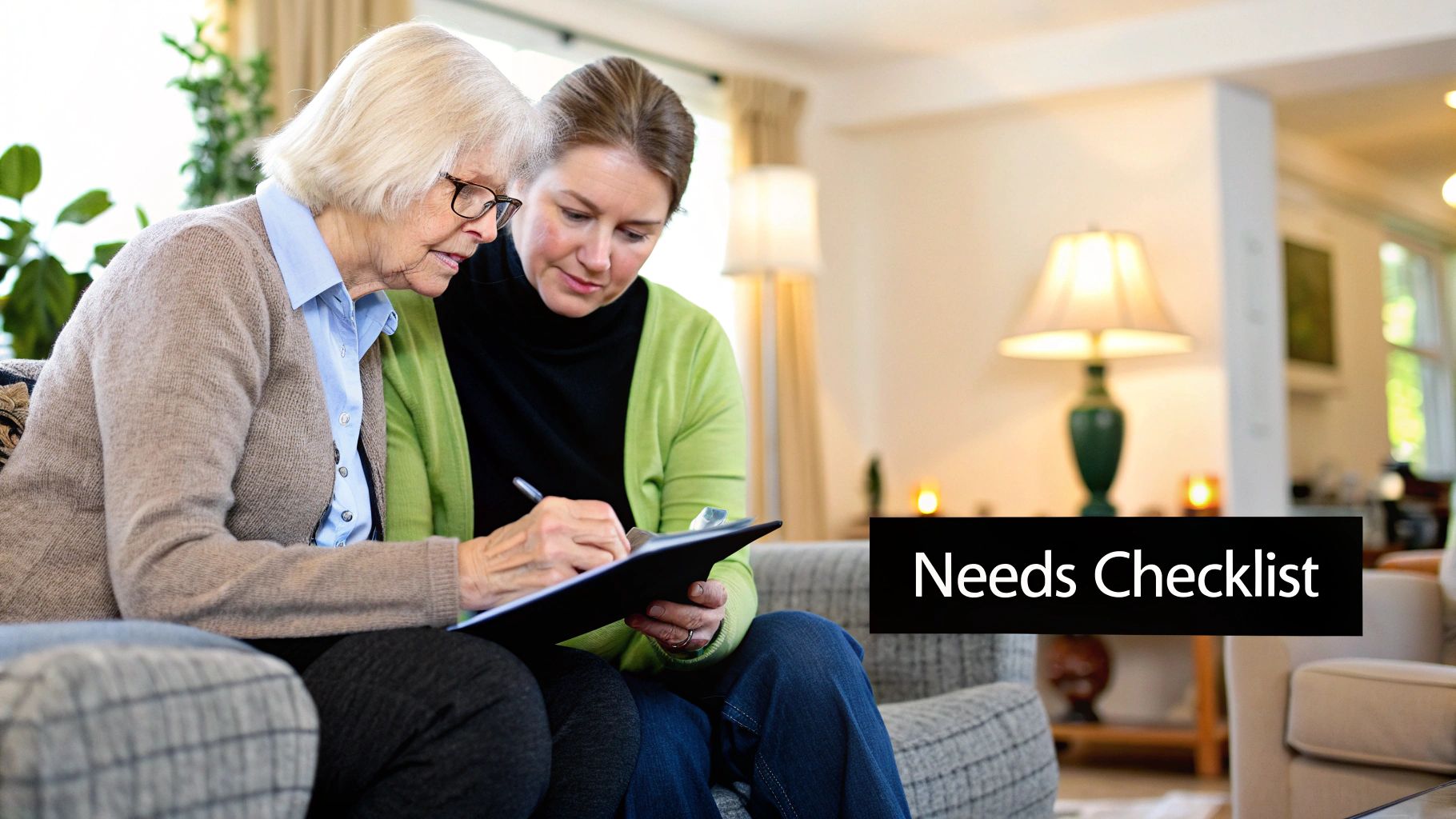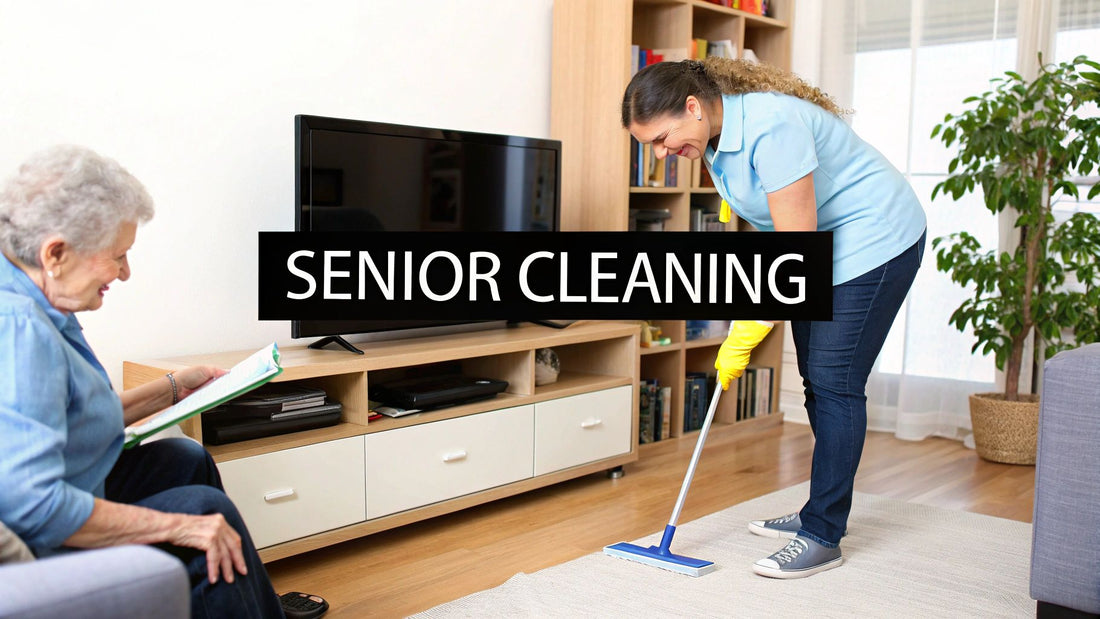Bringing in house cleaning services for elderly loved ones is about so much more than a tidy living room. It’s about creating a safe, healthy environment that helps them maintain their independence and age with dignity right where they feel most comfortable—at home. These services are built around the unique physical challenges seniors often face.
The Growing Need for Specialized Elderly Cleaning Services
As our parents and relatives get older, keeping up with the house can become a real source of stress, not just for them but for the whole family. Tasks that were once second nature can suddenly feel overwhelming or even become risky.
A clean, organized home is absolutely fundamental to a senior's well-being. It has a direct line to their physical health and, just as importantly, their state of mind.
This isn't just a feeling; it's a massive trend. The global home care market was valued at around $250 billion in 2023 and is on track to hit $383 billion by 2028. This boom is fueled by a strong desire for seniors to age in place, and specialized cleaning is a huge piece of that puzzle.
The infographic below really drives home the direct benefits of professional cleaning designed for seniors.

As you can see, it creates a positive cycle: a cleaner, safer home leads to better health, which in turn boosts independence and emotional well-being. For families, finding reliable cleaning help for seniors is a compassionate choice that brings incredible peace of mind.
Even looking at related services like professional move-out cleaning services can give you a good sense of the skill and attention to detail that true professionals bring into a home.
How to Assess Your Loved One's Cleaning Needs

Before you start looking for house cleaning services for elderly family members, you have to get a really clear picture of what "help" actually means for them. It’s about more than just noticing the house is a bit messy. The key is to approach this with gentleness and observation—think of it as a partnership, not a takeover.
The best place to start is with a simple, open conversation. Ask your loved one what tasks are getting tougher. You might be surprised to learn that while they can still handle light dusting, bending over to scrub the bathtub has become a major physical strain or even a serious fall risk.
Creating a Practical Task List
Walk through the home together, room by room, and make a detailed list of what needs doing. This isn’t just about spotting dirt; it’s about identifying the jobs that have become difficult, exhausting, or downright dangerous for them to tackle alone.
Focus on these key areas:
- Bathrooms: Is soap scum building up in the shower? Can they still safely get down to clean the toilet and floors? This is a high-risk area for slips.
- Kitchens: Check for old food in the fridge. Are they able to wipe down counters, wash dishes, and mop the floor without getting tired or losing their balance?
- Living Areas: Can they still push a vacuum around, dust high shelves, or move a small coffee table to clean underneath? These tasks require more strength than you'd think.
- Bedrooms: Is changing the bed linens becoming a real struggle? Has clutter started to pile up in corners or on surfaces?
By breaking down the home into specific, manageable tasks, you're creating a clear roadmap for any professional cleaning service. This helps ensure you only pay for the support that's truly needed, which protects both their independence and your budget.
Getting this level of detail is a crucial first step. In fact, it's always a good idea to understand what a care needs assessment involves, as that framework can help you tailor cleaning support to their exact health and mobility requirements.
To help with your walk-through, here is a simple checklist you can adapt.
Cleaning Needs Assessment Checklist
Use this table to make notes as you walk through the home with your loved one. It helps turn a vague sense of need into a concrete action plan.
| Area of Home | Essential Cleaning Task | Frequency (Weekly/Bi-Weekly/Monthly) | Notes (e.g., mobility concerns) |
|---|---|---|---|
| Kitchen | Sanitize countertops & sink | Weekly | Difficulty reaching back of counters |
| Mop floor | Bi-Weekly | Mopping is a slip hazard | |
| Clean out refrigerator | Monthly | Bending to reach bottom shelves is hard | |
| Bathroom | Scrub shower/tub | Weekly | High fall risk; cannot kneel |
| Clean toilet & floor | Weekly | Bending and scrubbing are difficult | |
| Bedroom | Change bed linens | Bi-Weekly | Lifting the mattress is too heavy |
| Vacuum carpets | Weekly | Pushing the vacuum is tiring | |
| Living Areas | Dust all surfaces (high & low) | Bi-Weekly | Can't reach high shelves safely |
| Clear walkways of clutter | As needed | Important for preventing trips |
This checklist gives you a solid foundation for discussing needs with potential cleaning companies.
Prioritizing Safety And Well-Being
As you build your list, always put tasks that directly impact health and safety at the very top. Things like sanitizing kitchens and bathrooms to kill germs, clearing floors and walkways of clutter, and making sure floors are clean and dry should be non-negotiable priorities.
Once you've got this detailed inventory, you'll be in the perfect position to clearly communicate your needs to potential cleaners. Doing this prep work makes the hiring process much smoother and helps you find a service that’s a perfect fit from day one.
Finding and Vetting the Right Cleaning Provider

Once you’ve outlined exactly what you need, it's time to find a provider you can trust with your loved one's home and well-being. Let’s be clear: not all house cleaning services for elderly individuals are created equal. You’ll want to look for companies that specifically mention senior care, as their staff are more likely to be trained in patience, communication, and the unique safety considerations of an older client.
A great starting point is asking for recommendations from local senior centers, neighbors, or even your loved one’s healthcare provider. Online reviews are also helpful, but try to look for patterns in the feedback rather than getting fixated on a single glowing or negative comment.
Key Vetting Criteria You Cannot Skip
Your peace of mind is everything, and a professional, reputable company will have no problem answering questions about their standards. Before you even schedule a consultation, make sure the company meets these non-negotiable criteria:
- Bonded and Insured: This is the most crucial checkpoint. Insurance protects against accidental damage to the home or property, while being bonded protects you from any potential theft. Always ask for proof of both.
- Thorough Background Checks: The company must conduct comprehensive criminal background checks on every single employee who will enter your loved one's home. There is no room for compromise here.
- Employee-Based Model: Whenever possible, choose a company that hires its cleaners as W-2 employees rather than using independent contractors. This usually means the company handles taxes, provides consistent training, and has more oversight over quality and conduct.
These safeguards are essential for building a foundation of trust and security. As you start to look into different providers, check out our guide on what to expect from a professional cleaning service for more tips on industry standards.
Important Questions to Ask Potential Providers
During your phone or in-person consultation, have your list of questions ready. The way a company responds will tell you a lot about their professionalism and whether they're a good fit for working with seniors.
A provider who is patient with your questions and provides clear, direct answers is often one that values communication and client comfort—essential traits when working with an elderly population.
Consider asking the following:
- What specific training do your cleaners receive for working with elderly clients?
- Do you use non-toxic, low-fragrance cleaning products to protect sensitive respiratory systems?
- What is your protocol if the regular cleaner is sick or unavailable?
- How do you handle feedback or concerns after a cleaning visit?
This vetting process is more than just a formality; it ensures the service aligns with the growing need for dependable in-home support. By 2025, an estimated 70% of people turning 65 will need some form of long-term care, which often includes cleaning assistance. You can read the full research on nursing home care statistics to better understand this trend. Choosing the right provider helps your loved one age safely and comfortably at home.
Understanding the Costs and Payment Options
Figuring out the financial side of house cleaning services for elderly loved ones can feel like a major hurdle. But once you know what to look for, it's a lot more straightforward. Professional cleaning services usually price their work in a few different ways, and understanding them helps you find a plan that works for your family's budget and your loved one's needs.
You'll often see hourly rates for one-off or flexible jobs, while recurring weekly or bi-weekly cleanings are typically a flat fee. For bigger, less frequent projects, like a deep clean before a holiday, a per-project price is standard. Our detailed guide on house cleaning prices breaks down what you can expect to pay for different types of services.
Beyond Private Pay
While many families pay for these services out-of-pocket, don't assume that's your only option. It's always worth digging into other avenues for financial help.
Some long-term care insurance policies actually cover non-medical in-home support, which can include housekeeping tasks. The key is to read the policy's fine print to see exactly what's included.
Also, look into Medicaid waiver programs in your state. These are designed to help seniors stay in their own homes by funding services that support daily living. They vary from state to state, but they often cover essential chores that keep a home environment safe and healthy.
The financial case for in-home support is compelling. Keeping a senior safely at home is often a more compassionate and cost-effective choice than moving them into a residential care facility.
The numbers back this up. With home care services averaging around $54,912 per year in the United States—significantly less than institutional care—it's no wonder that 90% of seniors prefer to age in place. You can find more insights on the benefits of home health care on boosthomehealth.com. Exploring every possible payment option can make this preference a sustainable reality for more families.
Preparing the Home and Your Loved One for the First Visit

A successful first cleaning visit really hinges on what happens before the cleaner even knocks on the door. It sets the tone for a positive, long-term relationship with house cleaning services for elderly relatives. The most crucial part? A clear and gentle conversation with your loved one.
Take the time to explain who is coming, what day to expect them, and exactly what they'll be doing. For many seniors, having a stranger in their personal space can feel unsettling. Framing it as a way to help them stay safe, healthy, and comfortable in their own home can make all the difference in easing any anxiety.
Setting the Stage for Success
Before the cleaner arrives for the first time, a little prep work goes a surprisingly long way. This isn't about "cleaning before the cleaner comes"—it's about making the home safe and the cleaning process efficient. A quick walk-through can make a huge impact.
- Clear the Pathways: Make sure walkways are free of clutter like stacks of mail, newspapers, or small decorative items. This prevents trips and falls for both your loved one and the cleaning professional.
- Secure Important Items: It’s a good idea to put away any valuables, important documents, or fragile heirlooms. This protects sentimental items and, just as importantly, prevents any potential misunderstandings from the start.
- Designate 'Do Not Touch' Zones: If there are specific areas, pieces of furniture, or collections that shouldn't be cleaned or disturbed, point them out clearly.
A well-prepared home allows the cleaning professional to focus on the tasks that matter most—sanitizing surfaces, reducing allergens, and creating a healthier living space—right from the very first visit. This proactive approach helps build trust immediately.
Common Questions About Cleaning Services for Seniors
Even after you've decided that getting some professional help is the right move, it's totally normal to have a few questions. When it’s about the safety and well-being of an older loved one, you want to be certain about every detail. Getting clear, straightforward answers is the best way to move forward with confidence.
What Makes a Senior Cleaning Service Different?
You might be wondering if any old cleaning company will do the trick. While any professional service can certainly tidy up, a company that specializes in house cleaning services for elderly clients brings a whole different level of care to the table. Their staff are often trained in senior sensitivity, which translates to more patience, clearer communication, and a real understanding of how important routine can be.
They're also much more likely to:
- Use non-toxic, unscented cleaning products to avoid irritating sensitive respiratory systems.
- Keep a sharp eye on fall prevention, making sure rugs are secure and floors aren't left slick.
- Know how to respectfully and safely work around medical equipment.
These specialized providers usually have much more rigorous background checks, too, because they're working with a more vulnerable group of people.
How Can I Be Sure My Loved One Is Safe?
Safety is, without a doubt, the number one concern for most families—and for good reason. Your first step should always be to only consider agencies that are fully bonded and insured. This is non-negotiable. It protects both you and your loved one from liability if an accident happens and covers any potential theft, giving you a crucial safety net.
The peace of mind that comes from knowing a cleaner has been thoroughly vetted is priceless. A reputable company will never hesitate to confirm that they run comprehensive criminal background checks on every single employee.
For some extra comfort, think about being there for the first few cleaning visits. It’s a great way to build a rapport with the cleaner and see how they work. It’s also a smart idea to secure any valuables, important documents, or sentimental items that could easily be misplaced or damaged.
What if My Parent Is Resistant to the Idea?
It’s incredibly common for seniors to push back against the idea of having a stranger in their home. This usually comes from a fear of losing independence or feeling like their privacy is being invaded. The key is to approach the conversation with empathy and patience, not pressure.
Try framing the service as a tool to support their independence, not take it away. Explain that it’s all about keeping them safe from falls and healthy in their own home for as long as possible. Get them involved in the process—let them look at company websites or even chat with potential providers on the phone. Sometimes, starting small with a one-time cleaning of a tricky spot, like the bathroom, can be a fantastic, low-pressure way to introduce the concept and let them see the benefits firsthand.
At Custom Maids, we understand the unique needs of senior clients and their families. For a compassionate, reliable cleaning service that prioritizes safety and trust, contact us today for a free consultation.

